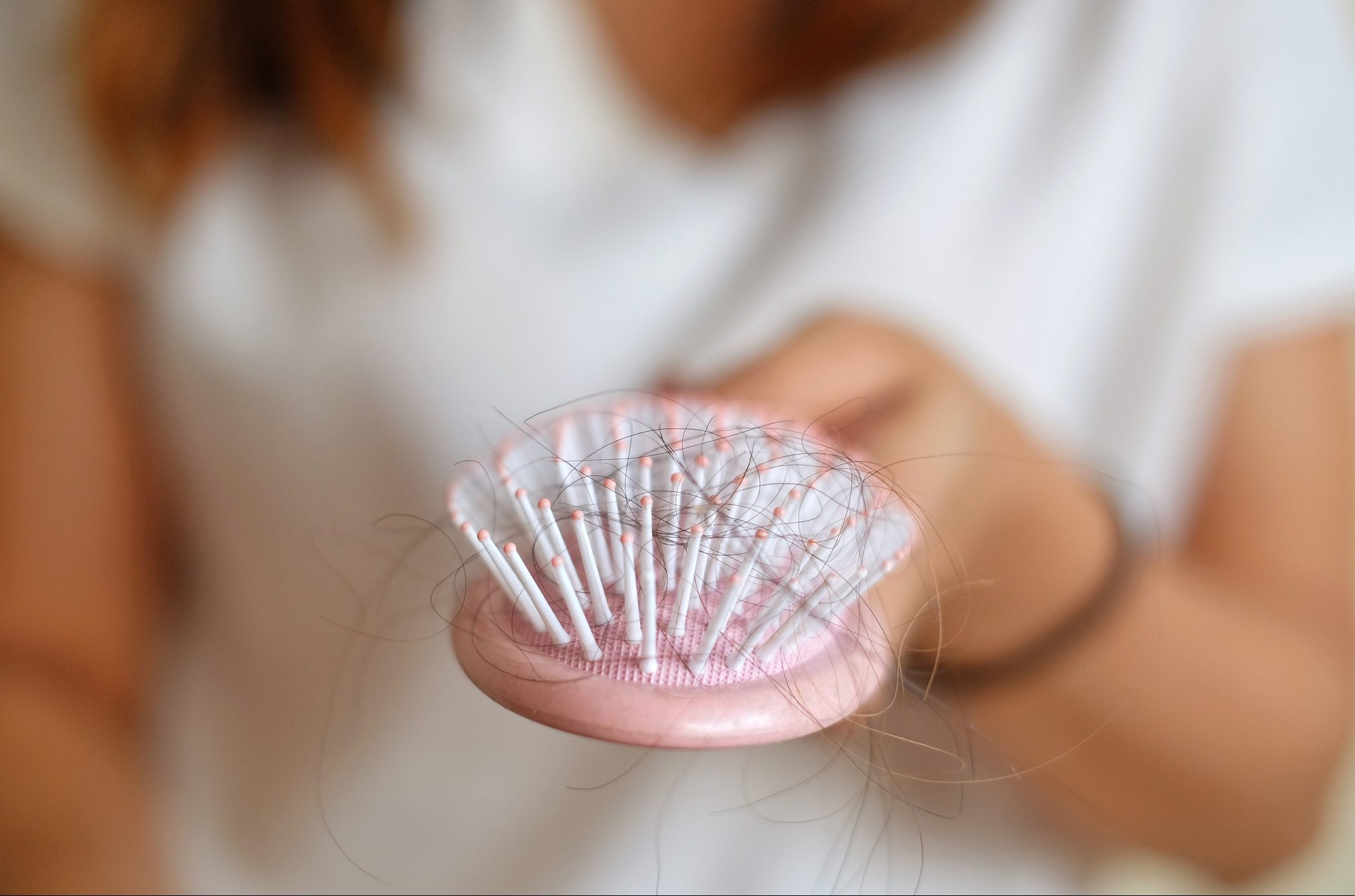Can Covid-19 Make Your Hair Fall Out?
Updated: Mar. 30, 2022
If you're losing hair during the pandemic, you're not alone. You also don't need to worry. Here's what to know about Covid-19-related hair loss.
Covid-19 hair loss
Three or so months after New York City imposed a shelter-in-place order, which came as a direct result of the number of Covid-19 infections, dermatologists at two area hospitals noticed an abrupt rise in the number of people complaining of hair loss—a 400 percent increase, according to an article published in the Journal of the American Academy of Dermatology.
Since then, others have noticed it as well, and not just in New York. Hair loss and Covid-19 are now popular search terms online.
“Any community severely impacted by Covid-19 will likely see an increase in cases of this type of hair loss,” says Shoshana Marmon, MD, PhD, the report’s senior author. “Hair loss is one of the most commonly reported complaints of ‘long-haulers,’ or people with persistent symptoms after infection with Covid-19.”
Here’s what you need to know about Covid-19-related hair loss.
(Learn more about troubling Covid-19 symptoms and complications.)
Temporary hair loss: Telogen effluvium
The medical term for this kind of temporary hair shedding is telogen effluvium, and Covid-19 is not the only cause.
“Telogen effluvium can occur not just with Covid but with any other significant illness or surgery,” explains Diane Jackson-Richards, MD, senior staff dermatologist and director of multicultural dermatology at Henry Ford Health System in Detroit.
“It’s the type of hair loss that occurs after a stressful impact to our body,” Dr. Jackson-Richards says.
That could mean an infection or surgery, as well as childbirth and even losing a large amount of weight.
Emotional stress (say, from the death of a loved one or a divorce) can also trigger telogen effluvium. There’s been plenty of stress to go around during the past year—for caregivers, for those grieving loved ones, for people who’ve lost their jobs, for, well, everybody.
Other causes of telogen effluvium include nutritional deficiencies, medications, and underlying health conditions.
Different types of hair loss
Telogen effluvium is a type of alopecia, which is an umbrella term for “hair loss.”
“Hair loss is a very complex process, and there are many things that can cause it,” says Abigail Cline, MD, PhD, lead author of the Journal of the American Academy of Dermatology article who is also with New York Medical College.
“Aging, hormonal changes, malnutrition, infection, stress, and autoimmune conditions can all result in hair loss,” she says.
But not all hair loss is the same.
“[Some] types of hair loss can cause scarring of the scalp and permanent loss of hair (like lupus),” says Dr. Cline.
Telogen effluvium is temporary and usually only affects your scalp. Compare that to the autoimmune condition alopecia areata, which results in loss of hair on the head and elsewhere on the body. In fact, telogen effluvium is really considered hair shedding rather than hair loss because it is temporary.
(Learn more about hair thinning, dandruff and other hair mysteries.)
Covid-19 and hair loss
Not much research has been done on telogen effluvium as it relates to Covid-19 specifically, but in her practice, Dr. Jackson-Richards has noticed that the condition seems less common in people who’ve had mild Covid-19.
“People who’ve been more ill, certainly hospitalized, I’ve seen more dramatic hair loss,” she notes.
The article she authored found that hair loss affected New York City Hispanic individuals the most. This group also had the highest death rate from the virus in that region.
Telogen effluvium can affect men, women, or children, though more women seem to be reporting Covid-19-related hair loss, says Dr. Jackson-Richards. This may be because they’re more conscious of it and seek treatment more than men.

The hair growth cycle
On an average day, we lose about 50 to 100 hairs. That’s normal, and new hair comes in to replace it.
Most of the hairs on your head are in the growth (anagen) phase. The rest are in the resting/shedding (telogen) stage. It’s a delicate balance that means you generally don’t notice the shedding—you have plenty of growing hairs to make up for any you lose.
With telogen effluvium, you can lose up to 300 hairs a day. Clumps of hair may fall out. With the growing-shedding balance out of whack, you can notice the hair thinning.
“Telogen effluvium happens when more hairs than normal are pushed into the shedding phase of the hair growth life cycle,” explains Dr. Marmon.
For that to happen, something has to trigger it, be it Covid-19 or something else.
Connecting a stressor to hair shedding
The telogen stage has a resting phase of two to four months, during which time the hair stays in the follicle, neither growing nor shedding. That’s followed by a shedding phase, says Dr. Marmon, who is also an assistant professor of dermatology at New York Medical College and dermatologist with Mount Sinai Hospital in New York City.
The resting part of the telogen phase makes it tricky to know exactly what prompted your hair shedding. After all, there could be two to four months between a stressor and visible signs of hair loss.
“Because of that lag time, people are often unaware that the stressful event and hair shedding are related,” explains Dr. Marmon.
How long hair loss lasts
When it comes to telogen effluvium, the good news is that it’s only temporary. The condition resolves on its own. How long it lasts depends on the cause, but it can take three or four months, or longer.
A study of Covid-19 patients in China, published in The Lancet in January, found that 22 percent were still shedding hair six months after leaving the hospital.
(Here’s more about symptoms that linger after Covid-19 infection.)
Treatment
The only treatment for telogen effluvium is to get rid of the cause. If it’s Covid-19, that means waiting and trying not to stress about it even if clumps of hair are falling out.
“When I diagnose a patient with telogen effluvium, my first suggestion is ‘don’t panic,'” says Dr. Cline. “Hair loss can be very troubling and create even more stress for the patient. I reassure them the hair loss will eventually get better, but it will take some time.”
Dr. Cline says that some people try minoxidil (Rogaine) twice a day on the scalp, but because this can take months to take effect, the telogen effluvium may already have resolved.
It’s important to take care of yourself as a whole individual, stresses Dr. Jackson-Richards. That means getting proper nutrition and making efforts to reduce anxiety.
(You might find these de-stressing techniques from wellness experts helpful.)
When to see a doctor
Usually the only symptom of telogen effluvium is hair shedding. If you also notice a rash, or a burning or itchy scalp, make an appointment with a dermatologist. These could be signs of something else.
Also see a doctor if the shedding hasn’t started to slow down after three or four months.
“If a person has six months of hair shedding and it’s continuing at the same rate, they should follow up with a dermatologist,” says Dr. Jackson-Richards.
That said, don’t expect immediate results. “It takes time for the body to recover and new hair growth to occur,” she says. “That’s not going to happen overnight.”
The bottom line
Many people are experiencing hair loss as a result of Covid-19 infection or pandemic-related stress. This is called telogen effluvium, and it will go away. It’s also normal after any kind of major insult to your body or psyche, whether that’s surgery, illness, or ongoing stress.
Next, check out these 12 Covid-19 symptoms everyone should know.



